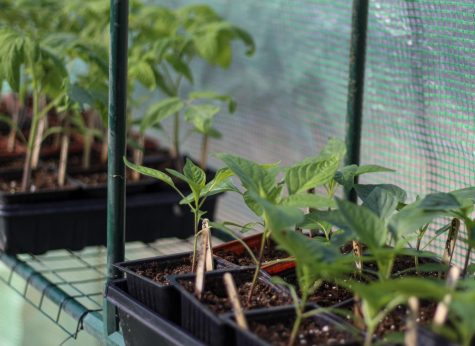Gardening: a beneficial hobby
The temperatures are rising, making now a good time to make plans for a garden. Anyone can maintain a garden whether it’s on acres of property or in a couple of beds in the backyard. Living in the Midwest, there are many crop opportunities since the natural soil and climate can grow endless types of plants.
One aspect to consider is to first introduce the seedlings to an outdoor greenhouse before planting in the soil to give the ground an opportunity to warm up. There are all sorts of greenhouses. Some are portable, making them easy to put up and take down every season, and can be bought at places like Lowes, Amazon, or even local garden shops. The other option is to build a glass and year-round greenhouse. Both benefit plants while the soil is getting used to the season changes.
Student Lane Blossom who is involved with his family farm speaks about what it’s like to run a produce stand: “A lot goes into it overall whether that’s the labor or constant maintenance. Towards the end of the season, our stand tends to run out of crops fast so we make sure to plant a little more every year since the sales grow every year.¨
While not everyone will farm as much as the Blossom family, there are endless reasons why self-gardening is spectacular for the environment. Since Earth Day is arriving these are some facts to consider: plants deliver oxygen into the atmosphere, remove carbon dioxide, regulate the water cycle, and give humans and animals access to true nutrients. All of these are necessities for the continuation of life on Earth.
A course students can take here at Concord to teach students about plants and agriculture is our new class as of this school year, Plant Science. Many students have learned and benefited from Mrs. Colangelo’s long history and knowledge of growing plants.
Student Gwen Bulko from the first-ever class describes her experience, “The class was absolutely awesome. Not once since attending this school have I been in the courtyard until taking this class. I really hope we continue offering this class because it was just a blast. there was not a single bad day in that class. It applies the opportunity to learn life skills and learn about the environment.¨

When starting a garden, it is important to understand and consider what type of crop outcome is expected when the season comes to an end. Some plants to start off with growing are squash, tomatoes, herbs, potatoes, strawberries, onions, cabbage, carrots, watermelon, peppers, corn, peas, beans, and much more. You can get these seeds almost anywhere.
Mr. Buck explains, “It is important to have a variety of plants, maintain weeds, and achieve moist soil. The first plants you can start for the season are tomatoes and peppers. You want to start these plants indoors or buy starter plants. For the other plants, you can plant them directly into the soil as seeds just after the last frost. Vine plants and herbs are the easiest plants to grow in my opinion. Overall, gardening is very soothing, you will always know what you’re eating making it better for you.”
Ms.Kelly is also an avid gardener who uses mostly raised bed gardens with the hugelkultur method, which layers natural materials and requires no tilling. She explains that there are fewer weeds in her gardens and much richer soil because of this process. Her family also manages a compost pile where the neighbors donate all their fruit and vegetable scraps that are mixed with grass clippings and fall leaves to then boost the soil quality in her gardens. She explains that, “ Gardening is a hobby that has been passed down for generations in my family. I’ve been lucky enough to be inspired by my parents and their gardening skills, and I love gardening with my sons, my two girls, and even friends.” She strongly encourages all students and their families to do some gardening, even if it’s in pots on a deck.
So whether it is putting a few seeds in the ground, planting some strawberries, or beginning a compost pile, here is to the start of a new season of gardening and an opportunity to learn about growing our own food for our families.
